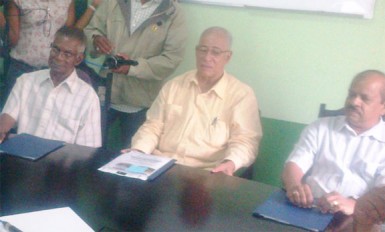The arbitrators who presided over the NAACIE/GuySuCo Tribunal yesterday revealed that workers in several categories, who were represented by the union, would receive wage increases, while an additional one per cent (1%) was awarded on all the union’s scales
The tribunal was presided over by Major General Rtd Norman McLean, who served as the body’s Chairman, as well as Dr Gobind Ganga and Professor Clive Thomas.
The tribunal’s decisions were detailed in a report which was yesterday handed over to General Secretary of the National Association of Agricultural, Commercial and Industrial Employees (NAACIE) Kenneth Joseph and Human Resources Director of the Guyana Sugar Corporation (GuySuCo) Jairam Petam.
The report noted the “turbulent climate” in which the GuySuCo has found itself, pointing out the high number of unrests and strikes which have been followed by arbitrations.
McLean, in particular, pointed to the fact that GuySuCo currently spends 63% of its earnings in wages, a practice which he described as unsustainable. He also noted that the company remains in a precarious financial situation despite receiving around $4.5 billion in subventions last year.

In the light of these realities, the report recommends the setting up of a GuySuCo-led partnership between the company’s management as well as GAWU, NAACIE and GLU to establish a compact and teamwork.
Petam, who reiterated that the offers made by the company were based on its ability to pay, said that it was regrettable NAACIE was unable to understand its shortcomings and resorted to applying for arbitration.
Joseph, however, said that the union’s hands were forced after the company refused to be cooperative in the bilateral meetings. He also said that though NAACIE did not get all it was asking for, the decisions of the tribunal were favourable.
According to Joseph, the two entities went to arbitration after the sugar company refused to correct wage and salary anomalies discovered during several evaluations in 2011.
In an unprecedented development, the report contained a proposal made by the company for wage increases for several categories of workers, which in the light of its previous opposition to paying the increases demanded by NAACIE, was surprising.
According to the report, GuySuCo “sought to address those anomalies affecting a total of 457 employees which will cost GuySuCo $2.740 million.” The report stated that the company had proposed an increase of 10% for 349 Junior Bookkeepers, Junior Sugar Boilers and Junior Laboratory Technicians; 8.4% increase for 32 Senior Sugar Boilers and Senior Laboratory Technicians; 5.1% increase for 65 Field Supervisors and 10%-12% increases for 11 other employees.
Considering this move, the arbitrators lamented that such an agreement could not have been made during the entities’ bilateral negotiations or later during conciliation. Dr Thomas was quoted in the report as saying “the union and the company should have come together and sorted out the anomalies.”
Nevertheless, the arbitrators found that “on examination of the anomalies the tribunal was not satisfied that all the possible anomalies were captured in GuySuCo’s corrected representation in light of the contention raised by the union. The tribunal therefore awarded an additional 1% on all the NAACIE scales.”

This award is to be paid no later than December 31, 2013.
NAACIE has had several scuffles with the management of the sugar company, which has resulted in multiple strikes and arbitrary measures over the years.
The latest conflict between NAACIE and GuySuCo originated last year after a Job Evaluation and Salary Survey Exercise carried out in 2011 revealed several anomalies in the wages and salaries being paid to workers represented by the union.
Joseph said the surveys and evaluations determined that workers represented by his union were receiving lower pay than employees in more junior positions. He said that in many instances even labourers, represented by the Guyana Agricultural and General Workers Union (GAWU) were receiving higher wages than their supervisors, who are represented by NAACIE.
He said there were also instances where newly employed personnel were earning the same amounts as workers who had been serving the company for several years. These “anomalies,” as Joseph called them, were unfair and needed to be corrected.
He said that as a result of these findings GuySuCo was said to have signed an agreement with the union to provide an increase of 22% in the existing salary scales and a further 10% increase across-the-board. The increases would have cost the company approximately $204 million in salaries.
Joseph said however, that during the negotiations in 2012, GuySuCo refused to honour the agreement and instead offered NAACIE a one per cent increase for its workers. This increase was also offered to members of GAWU as well as the Guyana Labour Union (GLU), which also had grievances with the sugar company over wage increases for their workers.
The agreement to make payments for 2011, Joseph said, was completely ignored.
Joseph said NAACIE refused to counter propose, and instead urged the company to continue the 2011 negotiations before attempting to make a decision for 2012. Petam however had explained that the company was not in the financial position to make the payments which were being demanded.

The decision not to pay the amounts led to strike action in which many of the approximately 1,000 NAACIE-represented GuySuCo employees participated.
The strikes were called off eventually but Joseph promised not to let up on his demands for higher wages for his employees. Several failed negotiation attempts later, Joseph requested that the matter be taken to arbitration.
On the issue of the across-the-board after a one per cent increase for all categories of workers for 2012, the tribunal approved the order-no increase beyond the one per cent across-the-board payment that is for the reasons already stated.




